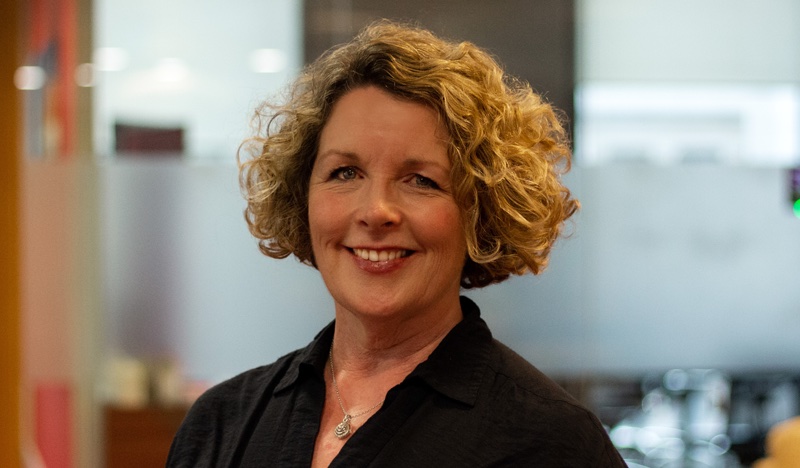Data availability, accessibility and quality is crucial in all aspects of the climate transition, from research to business action, from finance to policy design. Data obtained from climate-related disclosures by institutions and companies provide a fundamental basis for decision-making at different levels. However, data is not always available, reliable, or comparable.
“Decision makers such as policymakers, regulators and investors are increasingly demanding this information,” explains Sue Armstrong-Brown, Global Director of Environmental Standards and Thought Leadership at CDP, the global environmental disclosure platform. Armstrong-Brown’s role is to ensure that CDP’s disclosure is developed to drive the transparency, insight and action needed to deliver a net zero, nature-positive economy.
Why is data obtained from climate-related disclosure so crucial to accelerate climate action and meet the Paris Agreement goals?
Commitments without accountability are meaningless. The data obtained through disclosure is critical for holding companies to account for their net-zero commitments and action, tracking progress against the Paris Agreement goals, providing robust data for the Global Stocktake and avoiding greenwashing.
Without credible, comparable and consistent data, we are flying blind. It is critical that data includes environmental risks, opportunities, dependencies and impacts, commitments and pledges.
CDP recently published our ten principles of high-quality mandatory disclosure, which serves as a guide for policymakers in what data should be collected through mandatory disclosure regulation. This includes looking at the wider environment, not only climate and key areas of a corporate net-zero journey such as transition plans and scope 3 emissions [all indirect upstream and downstream emissions that occur in the value chain of the reporting company – editor’s note].
What are the main challenging areas to date in the path to net-zero due to the lack of data?
Scope 3 remains a challenging area. Addressing Scope 3 emissions is a critical step on the path to net-zero; the entire value chain must be engaged to fully evaluate and truly reduce emissions. However, this continues to be largely neglected by companies and therefore investors and policymakers lack robust data.
While CDP research found that on average Scope 3 emissions are 11.4 times higher than operational emissions, most companies are lagging in action on them. Last week we released new research that found less than half (41%) of companies disclosing through CDP are reporting on any of their supply chain emissions.
Reporting of Scope 3 emissions through CDP’s disclosure platform has been increasing for many years, but not as much as we need it to. Scope 3 emission disclosure is set to be included in the ISSB climate standard, European Sustainability Reporting Standards (ESRS) and in the US SEC’s proposed climate disclosure rule. We are confident that this will drive more companies to disclose this important information.
Moreover, historically, the lack of standardization has been a major issue. However, there is a harmonization movement which CDP has helped drive, which is rectifying this. New frameworks and standards such as the ISSB, ESRS and TNFD (Taskforce on Nature-related Financial Disclosures) will be critical in providing structure and guidance.
There has also been a focus on large and listed companies, which have the resources to put toward sustainability reporting.
Who are the main actors that are asking for climate data in this context, and where can they find them?
Decision makers such as policymakers, regulators and investors are increasingly demanding this information. In 2023, more than 740 leading financial institutions with over 136 trillion USD in assets and 340+ major buyers with over 6.4 trillion USD in purchasing power requested companies disclose through CDP in 2023 – the largest ever request for environmental information.
CDP is the global environmental disclosure platform and as such, serves as a one stop shop for these actors to access the data they need, which is consistent, comparable and standardized, to inform their decision-making. CDP investor signatories and supply chain members can access this data following their annual disclosure request. One disclosure through CDP reaches hundreds of investors and is utilized in investment research, powers new financial products, indices and ratings including Dow Jones Sustainability Indexes, Bloomberg, MSCI ESG Research, the STOXX Low Carbon Indices and the New York State Common Retirement Fund’s low carbon index created by Goldman Sachs.
Last year, we also launched a government dashboard, ensuring that governments and regulators can access corporate and subnational government data in a way tailored to their needs.
What is the role of CDP in the context of frameworks and standards set by the policy sphere?
CDP’s role is now only more important, in a world of increased scrutiny and regulation. As the independent global environmental disclosure system, CDP is the only organization that can rapidly scale the adoption of impactful and high-quality frameworks and standards across the global economy.
CDP translates frameworks into actual disclosure questions and a standardized annual format, providing investors and companies with a unique platform where frameworks and standards can be brought into real-world practice through the collection, analysis and sharing of data. Companies disclose robust environmental impacts on a variety of issues including forests, water security, biodiversity and plastics, and disclosure includes forward-looking information, target setting, plans to seize opportunities and mitigate risks.
By incorporating impactful, high-quality frameworks and standards, the 23,000 entities (worth 66% of global market capitalization) already disclosing annually through CDP’s platform will be reporting against them – disclosing and providing data to stakeholders in a way that is standardized, comparable and accessible regardless of region or regulatory requirements.
In 2024, CDP’s questionnaire will be aligned with the IFRS S2 climate standard and will begin to reflect the TNFD framework. We are also committed to reflecting the European Sustainability Reporting Standards and upcoming SEC climate disclosure rule.
Are small businesses involved in this process?
Small and medium enterprises (SMEs) make up a significant proportion of the global economy. Globally, microenterprises (SMEs with fewer than ten employees) account for 70 – 90% of all firms. In the UK, 9 out of 10 businesses are SMEs. SMEs also have significant environmental impacts. For example, SMEs are collectively responsible for around the same level of emissions as large firms, with the UK Government recording splits of almost 50/50 in recent years. So, it is crucial that SMEs are equipped with the tools, resources and frameworks needed to commit to and accelerate environmental action and boost their own resilience.
CDP has been working to support SMEs to measure and act on their environmental impacts through the SME Climate Disclosure Framework, which is designed to make strategic and impactful climate commitments, track and report progress against those commitments, and demonstrate climate leadership. By offering a tailored approach to environmental disclosure, we are breaking barriers for SMEs to participate actively in sustainability efforts. From 2024 we’ll be deepening our engagement with SMEs through a standalone SME questionnaire.
What can we expect from COP28 and beyond in terms of advancements in climate disclosure?
The first Global Stocktake is set to conclude at COP28. The data obtained through disclosure has played an important role, providing data and insights to inform the Global Stocktake. It’s now critical that the Global Stocktake outcome, set to be agreed at COP28, provides a concrete, actionable roadmap for all actors, not just governments, to drive transformative action on climate and nature.
There is still far to go in turning commitments into tangible action. While the number of 1.5°C -aligned science-based targets disclosed is increasing year on year, CDP analysis showed that only 24% of disclosing companies are actually on track to meet their targets.
The journey for corporates and cities is clear:
- Disclose through CDP to understand risks, opportunities and impacts.
- Set science-based targets for climate and nature.
- Develop and disclose a transition plan ensuring that robust, time-bound plans are in place to deliver on commitments, and the can isn’t just being kicked down the road. Less than 1% of companies disclosing through CDP report all elements of a credible plan.
- Once a company has this, they must continue assessing their performance and raising ambition by disclosing it annually.
Once the first Global Stocktake has concluded, a key next step is governments’ reports under the Enhanced Transparency Framework (ETF). The ETF specifies how countries should report on their progress in mitigating and adapting to climate change, and the support they have provided and received.
The ETF should build on the momentum of non-state actors’ engagement in the Global Stocktake to include both corporate and subnational data in Biennial Transparency Reports (BTRs). Including non-state actors is important to ensure accurate information that can guide decision-making; for example, in implementing decarbonization policies in line with NDCs; and to accurately track progress towards achieving them. The inclusion of non-state actor data also brings further potential to enable closer links between governments and non-state actors themselves, including sharing of comparable, consistent, and credible information to catalyze wider change by providing evidence of action, to include in policymaking, and enabling a wider range of actors to help deliver national commitments and identify and address the gaps and challenges that remain.
CDP will provide the Net-Zero Data Public Utility (NZDPU) with access to core climate data from hundreds of high-impact companies for the launch of the NZDPU proof of concept at COP28.
The NZDPU is intended to act as an open, free, and centralized climate transition-related data repository. Once development is completed, the NZDPU is intended to ultimately be integrated with the United Nations Framework Convention on Climate Change (UNFCCC)’s Global Climate Action Portal, to which CDP already provides data.
The proof of concept – or pilot – will provide an initial set of companies’ standardized direct (Scope 1) and indirect (Scope 2 and 3) gross and net GHG emissions data and emissions reduction targets from data collected through CDP’s annual disclosure invitation.
This foundational layer of CDP data will allow users to experience the initial set of features and functionality of the NZDPU and to offer valuable insights to inform its future releases. The data from nearly 400 companies disclosing through CDP will be included in the proof of concept.

Sue Armstrong-Brown
As Global Director of Environmental Standards and Thought Leadership, Armstrong-Brown’s role is to ensure that CDP’s disclosure is developed to drive the transparency, insight and action needed to deliver a net zero, nature-positive economy. Her remit includes working with thematic leads to ensure CDP’s questionnaire embodies the best practice in environmental disclosure and standards, and to develop and share data analysis and insights which promote a greater understanding of the decisions needed to drive change.
Before joining CDP in 2022, Armstrong-Brown was CEO of Adoption UK, Policy Director for Green Alliance, Head of Conservation for the RSPB, and a scientific advisor for the UK Government . Her early career was in environmental research, and she was one of the scientists recognised for contributing to the IPCC’s Nobel Peace Prize. Armstrong-Brown holds a Joint Honours degree in geography and biology from the University of Bristol and a PhD in sustainable agriculture from Imperial College London.






